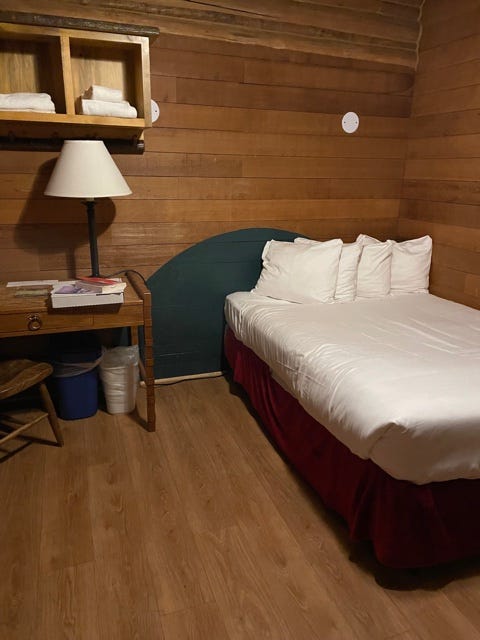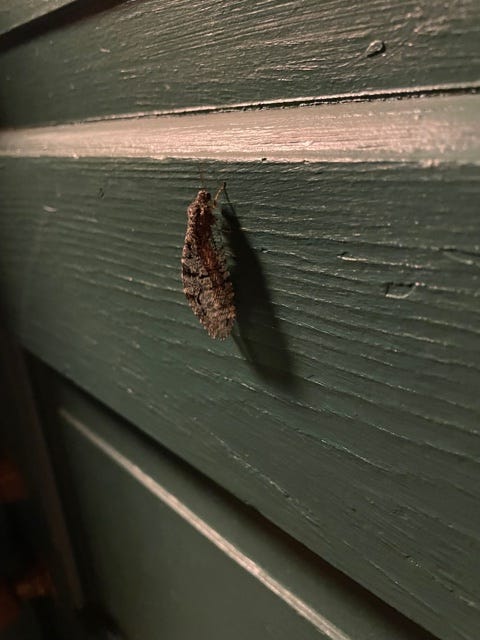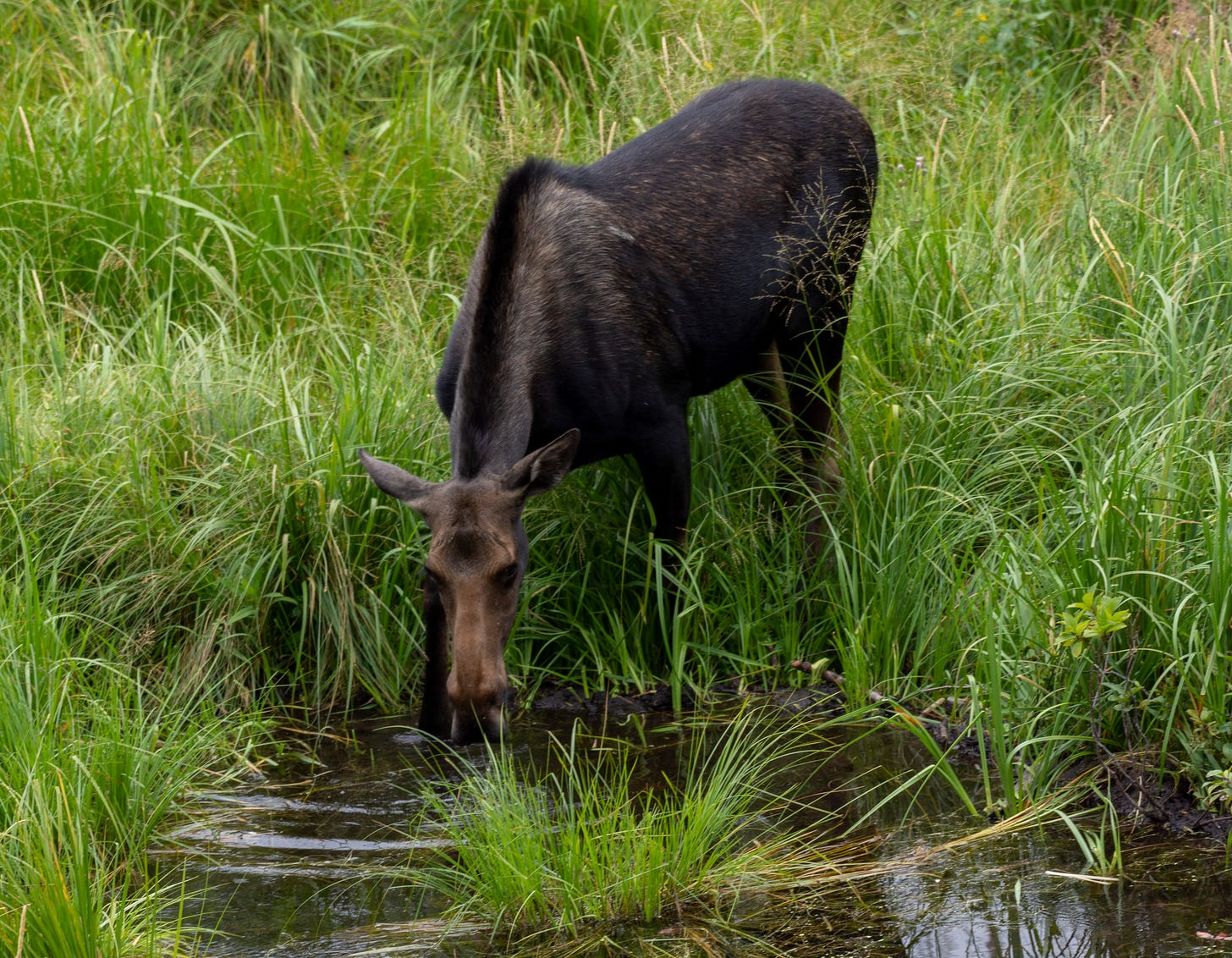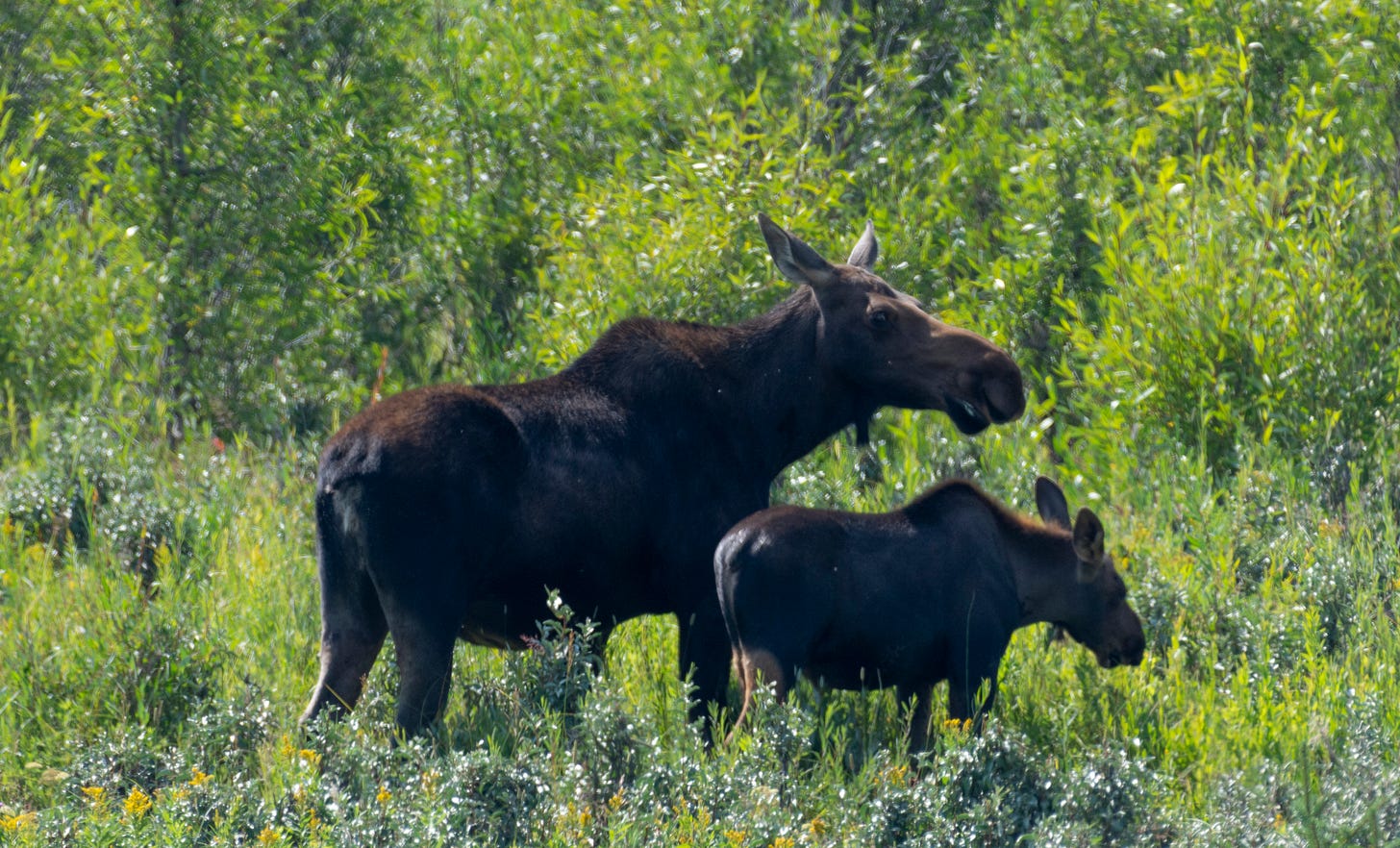Sharing Solitude
Solitude’s a tricky little fish, isn’t she? One minute flashing out in the open, the next flicking her tail and she’s in the shadows, you’d never notice her, she bobs with the grasses, you’re standing confused, alone but not in solitude, your head a mass of contradictions, all there is is you but which you, which fish, the fish is gone.
When I settled in for solitude during my first few days in the Grand Tetons, I did it in a cabin that you cannot rent online; you must call to reserve it.
It was a Colter Bay cabin, and I’m not sure why, exactly, you had to vocally state your interest in the cabin.
These cabins had no running water, so maybe they simply needed confirmation that yes, you were willing to walk to a shared bathroom in the middle of the night in bear country and — because inevitably someone else would be using it — try not to test the handle too many times while you waited.
But the cabins were also historical — special — and maybe that’s why they made you call. They had a small, framed print in the room explaining the history, but I’ll go ahead and write out the last paragraph here.
Like the early Jackson Hole homesteads, the cabins at Colter Bay are nestled companionably together. They reflect the culture of the early settler who, although limited by the constrains of the covered wagon would usually manage to bring along at least on prized piece of furniture from the old home. The little custom-designed dresser represents that piece in this cabin. The painted headboard was a frequently used replacement for the piece that wouldn’t fit into the wagon or that had to be used for firewood along the way. As you stay in the Gabbey’s old cabin and go about the many activities available in this beautiful park, you are adding to the history of this sheltering place. We sincerely hope that your stay is a happy chapter in that history.
The prized dresser.
The bed with the painted headboard.
I was alone in my tiny cabin with the beloved dresser, but also, deeply, not.
First, there were the moths that visited me in the evening.
I am not sure which kind of moth this is, with its beautiful transparent wings. Please let me know if you can identify it!
I learned to open and close the door gently, so that they might feel they had landed on a swaying branch and would not stir.
Second, my cabin was in the back of the restaurant and takeout place that served all of Colter Bay Village — a sprawling area that included campgrounds, an RV park, and the cabins. Due to COVID, I wasn’t eating indoors, so for a while — until I got the lay of the land and figured out some other options — that limited me to what was served at the Colter Bay takeout “cafe”: pizza, beer, mounds of iceberg lettuce with a few croutons that was labeled “Caesar salad” and sold for $12, and single servings of Häagen-Dazs ice cream that came with a mini spoon built into the lid.
I arrived as a stranger, but on the evening of the second day, when I could no longer stand another slice of pizza and broke down and bought the $12 carton of iceberg lettuce, the teenager behind the counter smiled at me in sympathy. “I just can’t take it anymore,” I said, and she laughed, and suggested coming back later for the ice cream so it didn’t melt while I ate the salad.
I ate my dinners at the back picnic table, near where the cafe workers took their breaks and flirted and gossiped, and after a while, they got used to me: trying to read by the light of fireflies, trying to identify birds that by this point all looked grey and black, trying to listen and not listen, trying to finish my beer. (I can never finish my beer.)
We never talked, the teenagers and I, but we knew the others existed.
As a culture, we have a hard time with solitude, and then again with people whom we expect to live in solitude and then don’t. I’ve read so much lately that complicates the story of Thoreau, for instance, or Emily Dickenson — people of whom we expect such a high level or purity that finding out that they had any interaction at all with their families or neighbors can feel devastating. But what if solitude is a tricky fish? What if she’s a little messy?
As Steve Edwards pointed out in a recent Lithub essay:
In the last few years—online and in print media—bashing Thoreau has become something of a pastime. Garrison Keillor called him a “sorehead.” Bill Bryson called him “inestimably priggish and tiresome.” People on Twitter regularly mock the fact that Thoreau’s mother brought him food and attended to his laundry while he was at Walden, latching onto this detail as evidence that his rugged individualism was built on the back of women’s unacknowledged labor. On this last point, the writer Rebecca Solnit—who knows a thing or two about both Thoreau and what it means to be a feminist—pushed back in an article in Orion, describing the Thoreau family’s relationship to domestic labor as one in which they “reinforced” each other, each offering work on behalf of mutual and egalitarian benefit. As she put it, people “pretended to care who did Thoreau’s laundry as a way of not having to care about Thoreau.” And in relegating Thoreau’s mother to the laundry pile, Thoreau’s critics themselves unwittingly erased her efforts as a conductor on Concord’s underground railroad. “My position now,” Solnit wrote, “is that the Thoreau women took in the filthy laundry of the whole nation, stained with slavery, and pressured Thoreau and Emerson to hang it out in public, as they obediently did.”
Fenton Johnson, the author of At the Center of All Beauty: Solitude and the Creative Life commented on the same phenomenon, writing:
‘No other male American writer,’ observes Laura Dassow Wilds in her fine and sympathetic biography, ‘has been so discredited for enjoying a meal with loved ones or for not doing his own laundry.’ The reasons for that discrediting, I argue, arise from our need to savage solitaries who so emphatically and cheerfully break social norms, because they show how easily it may be done, as well as our suspicion and mistrust of those who sing in praise of solitude.
I brought on the Grand Tetons trip Jane Hirshfield’s book The Nine Gates: Entering the Mind of Poetry because I always bring it with me when I’m going to be out in nature. It’s a book that I’m never not reading, and also a book that I can never finish, though I’ve been reading it for a decade or more. The problem is that I can pick it up anywhere and still learn from it, and so I do, and then I’m lost again, at that point, wherever it is, completely captured by this one moment, this one fish.
Hirshfield writes that “part of any good artist’s work is to find a right balance between the independence born of solitude and the ability to speak for and to others.” She illustrates her point with this poem by the T’ang poet Wang Wei:
In my middle years I became fond of the Way,
And made my home in the foothills of the South Mountains.
When the spirit moves me I go off by myself
To see things that I alone must see.
I follow the stream to its source,
And sitting there, watch for the moment
When clouds rise up. Or I may meet a woodsman,
We talk and laugh and forget about going home.
(trans. Tenshin Reb Anderson)
A solitary might watch for the moment they clouds rise up. Or, they might meet a woodsman and talk and laugh and forget about going home.
One morning, after I was alone no longer — my Mom and Michael were with me — and I had moved to a larger cabin, and my Mom was in the lodge and my solitude, such as it was, was definitely over, I realized we hadn’t seen moose yet and I was anxious to show them off.
I had seen moose early in my visit, without even trying really — I had driven up to a parking lot at the top of Moose-Wilson road, and followed the gaze of the crowd who were also in the parking lot and saw a dark brown hump shifting in the distance, behind a clump of trees, and was somehow inspired to say, “moose?” And the crowd said “moose!” back to me, and we grinned at each other like idiots, as if we had invented the animal and the word to boot.
“Moose!” we kept saying to each other. “Moose!” I’d say to any new arrivals. It was a pretty easy song to master, but somehow infinitely fun to riff on.
Now that Michael and my Mom were here, though, nothing was working. The moose weren’t on the Moose-Wilson road. They weren’t in the Willow Flats. I kept trying the Gros Venture road, way to the south, which seemed like perfect moose environment — it followed the banks of a river that divided and dodged between stands of trees — but without any luck, until one morning, when Michael wasn’t feeling very well, I told him to wait in the car while I walked the trail.
So, I walked alone and it was beautiful, but there were no moose, and finally I turned around and was most of the way back to the car when I heard a rustling, out to my left, by the river, and there was a moose! A mother and her calf!
By some miracle, I had a little cell service, so I texted Michael, “Moose!”
He started walking towards me while I started taking pictures, and then other people driving by saw me taking pictures, and they stopped and started walking towards me too. “Moose!” I said to them.
“Moose!” they said back. We grinned and nodded like idiots, like people delighted to share in their solitude together.
One update: the all-clear has been sounded on feeding birds again! Scientists aren’t sure what happened, but it appears to have cleared up, so for now, feel free to go wild with those sunflower seeds.
Also, I just have to add that I’m thinking of Louisiana at this time — it’s where I’m from, and it’s a unique place in all kinds of ways, environment included. My thoughts are with everyone in Ida’s path.










Really enjoyed reading this. I'm reading Reclaiming Conversation by Sherry Turkle, and she mentions that Thoreau had 3 chairs in his cabin. "One for solitude, two for conversation, and three for society." and when he had more guests he took them outside into nature. Like Hemingway, ridiculing him has become a pastime, and I'm not sure why. Easy target, I guess.
I look forward to your travels. I'm not ready yet. But we will be visiting friends in New England this fall, and I'm very happy about it. We saw moose in Alaska, I doubt we'll see any this trip.
Moose!
Each post is more precious than the previous one! I love your musings and your photographs. (And I promise to think better of Thoreau and especially of his mom.)